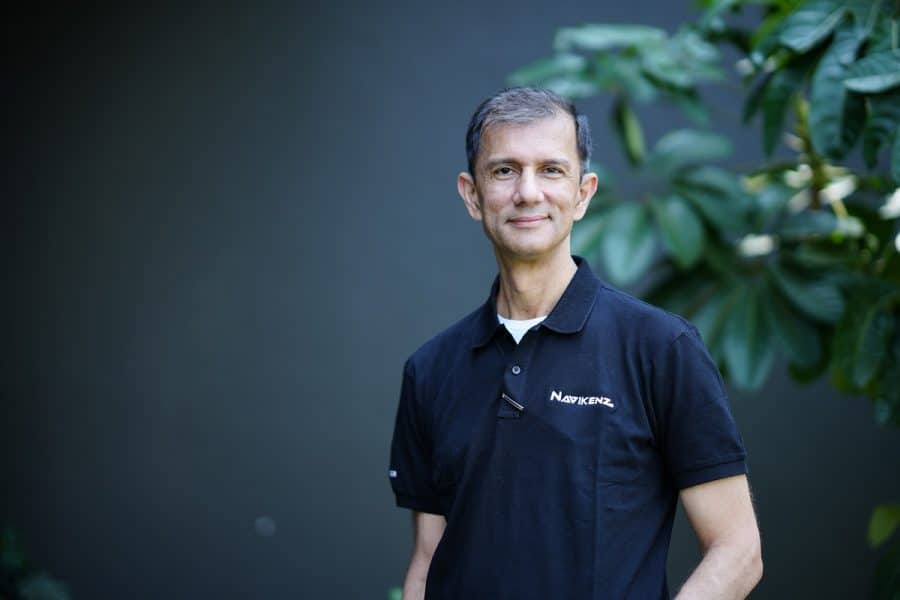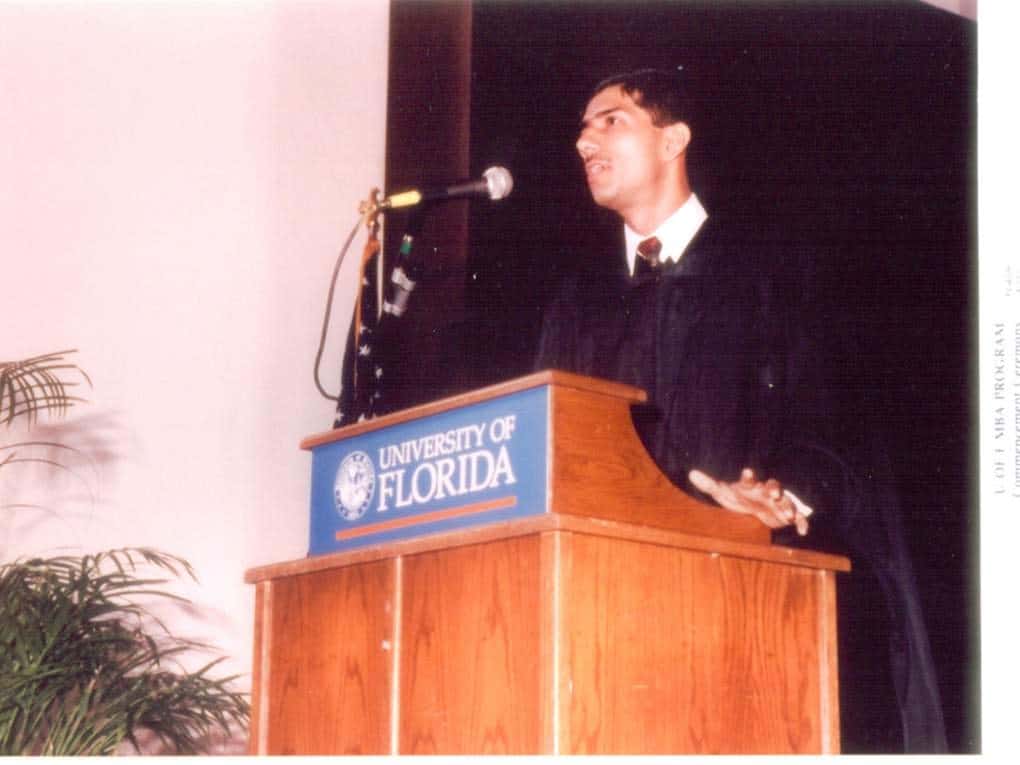
Creating opportunity with enterprise
Anjan Lahiri (MBA ‘93) helped build Mindtree into a billion-dollar company and now leads AI-focused Navikenz, driven by lessons on using business to create opportunity.
Anjan Lahiri (MBA ‘93) had no idea what to expect when he landed in Orlando from India more than 30 years ago. Having never left India before, his only impression of the United States was what he had seen in movies or read in books.
He remembers the experiences so many immigrants have when they arrive in the U.S., from the overwhelming choices on grocery store shelves to driving on large roadway systems never before seen. Lahiri was most excited, though, about not having to buy a winter coat during his next two years in the University of Florida’s MBA program. Saving money for other opportunities would be paramount, as Lahiri would learn early into the program.
“I noticed that my classmates were going out together after class, hanging out together,” he recalled. “And that’s when I learned about the happy hour.”
Lahiri’s introduction to networking came with its challenges as someone who didn’t have a car to drive to meeting locations or much spare money to buy drinks. He did have a bicycle, though, which took care of one of his obstacles.
“Once I got to the bar, I realized that I could ask for a glass of water and not get charged anything!” he joked.
Beyond the critical lesson of networking, Lahiri credits the University of Florida Warrington College of Business with helping him build his business foundation.
“I am indebted to UF for teaching me the culture of business,” he said. “The most important thing that I learned at UF was how companies work and how societies work for the betterment of a country.”
As someone who came from making $800 a year in India at the time, Lahiri was focused on using his business education to better those around him.
“A lot of my personal drive was how the disadvantaged in society can be helped and aided towards a more sustainable life, the minimum sustainable life that is required for families to live,” he said. “But in order to do that, UF taught me the role of business in enabling the creation of money in society where none might exist before the enterprise. Uplifting society is not about distributing money, but about creating money.
“UF taught me to be unapologetic about that – about creating money with enterprise.”
With his UF business foundation and personal drive, Lahiri put his knowledge into action over his decades-long career in technology, which includes co-founding a billion-dollar company, innovating two public businesses and running a new AI-focused venture today.
Lahiri also credits the assistance of former Warrington Dean John Kraft with helping him get his start in the business world. Despite being valedictorian of his graduating class, the recession of the early ‘90s plus his status as an immigrant, Lahiri struggled to find a job at the time of graduation.

“I had taken a loan to do my MBA, and if I did not get a job, I would have to go back to India,” he said. “With my salary in India, there was absolutely no way in which I could pay the loan back. So, I had my back against the wall to put it mildly.”
Lahiri ended up getting a call from fellow MBA graduate Gus Vidaurreta (MBA ‘84), founder of Systems Consulting Group (SCG), asking him to come to Miami for a written evaluation and interview. With a perfect score on the evaluation and positive interview, Vidaurreta hired Lahiri into his first role.
“Fifteen years later, Gus told me that Dean Kraft had called him and told him to hire me,” he said. “Gus gave me a break that I am deeply indebted to him, Dean Kraft and the University of Florida for.”
Lahiri stayed with SCG, which later became Cambridge Technology Partners (CTP), through the 1990s before reconnecting with his former coworkers at Wipro, a company he previously worked for in India. Lahiri was instrumental in bringing together a group of his connections from Wipro and CTP to create Mindtree, the company he built operations for across the U.S., Europe and Asia over the next decade and a half. At the time the company sold in 2019, it had 20,000 employees and $1 billion in revenues.
After an additional several years investing in companies that he would help rebuild and drive business growth at, Lahiri was ready to be, as he called it, “a full-time homemaker.” During that time, the pandemic struck, giving Lahiri additional time to really think about what he wanted to do next and why.
“In doing some other private equity deals, I realized that what I wanted wasn’t to join a company for money or recognition,” he said. “I wanted to find my purpose and build something that I wanted to work at for the next 15 years.”
Lahiri found his purpose in Navikenz, an AI-focused IT services company, which he founded with a few former colleagues in 2022. The company has reminded Lahiri just how much he is passionate about the technology industry and how he can use his business skills to help others.
“I feel 20 years younger today, and I love this industry simply because this is an industry which has to do not with technology but with people,” he said. “In this industry, you work with great people and learn from [them]. This is an industry where every month you will be pushed and exposed to something you did not know existed before.”
With AI, Lahiri is excited about what the future holds and how generative AI tools can help businesses redevelop in new and innovative ways.
“AI will and is surely changing the world, but the most important thing is not the technology but the business processes where it will make its impact felt,” he explained. “AI will not just automate business processes but enable complete reengineering of them.”
As someone with decades of experience building and redeveloping businesses, Lahiri shared some of his top insights for leading a growing company.
Competition is irrelevant
“My limited view based on my own experience is that running companies, turning companies around, growing companies, has really nothing to do with competition,” he said. “Competition is irrelevant as long as you are in a space that is growing.”
The most important thing, Lahiri said, is to figure out what your own capabilities and vision are.
“What your leadership and what you can uniquely do in the spaces that you chose to compete in [is paramount],” he said. “What keeps companies back is not competition but their ability to deal with the opportunities that businesses always present in a growing space – most often it is your own abilities, and internal strife that limits you, not competition.”
Leadership alignment is key
No matter the size of the company, if your top management team isn’t on the same page, you won’t get far, according to Lahiri.
“These 10 to 15 people must be aligned on a common mission and a common vision for what they want to do not only for the business, but personally,” he shared. “Personally, all of us don’t need the same thing, don’t want the same thing, but it must align toward the same mission for the company. There will be conflict, and conflict will give rise to better decisions and better ideas, but you as a leader have to direct conflict in a productive way.”
People work for purpose
Money is important for people in their work, but it’s not everything, Lahiri noted. It’s your job as a leader to give people their purpose.
“Money is important, but people don’t work for just money, they work for a purpose,” he said. “Give them that reason why they woke up today and did not do what they were asked to do, but what they wanted to do. And what they wanted to do must be aligned with the overall organization’s mission and vision – that is your job as a leader.”
Be transparent
Lahiri notes how critical it is to tell people where it is you want to take the company, while reminding them where it is now. This reminder helps them connect the dots on how to get to where the company wants to be from where it is today.
“It is impossible for people to feel engaged with an organization if they don’t know what the organization does, what its challenges are and what its opportunities are,” he said.
With transparency as a standard practice, companies can motivate in both good times and bad, Lahiri believes.
“It is easy to be communicative when things are going well but what is important is to communicate when things are not going well,” he said. “People will rally together in good times, but they will rally together even more in tough times as long as they see that the values are right and they believe in the mission.”
Have ownership, but don’t let it inflate your ego
Ownership is an important feeling for being a critical contributor to the success of a company, Lahiri shared. It creates a deep sense of loyalty and commitment to the betterment of the team as well as giving purpose.
“Every company that I’ve worked with, from the first day that I started my career, I felt it was my company and I owned the company,” he said. “But unconsciously, I think that also gave me a sense of importance and perceived indispensability. That was a mistake.
“The ‘inevitability of my irrelevance,’ is something that I’ve learned over the years, and I wish I was more aware of in my younger years. Nobody is irreplaceable and nobody is all important. Least of all myself.”
Related stories
For the media
Looking for an expert or have an inquiry?
Submit your news
Contact us
Follow us on social
@ufwarrington | #BusinessGators


